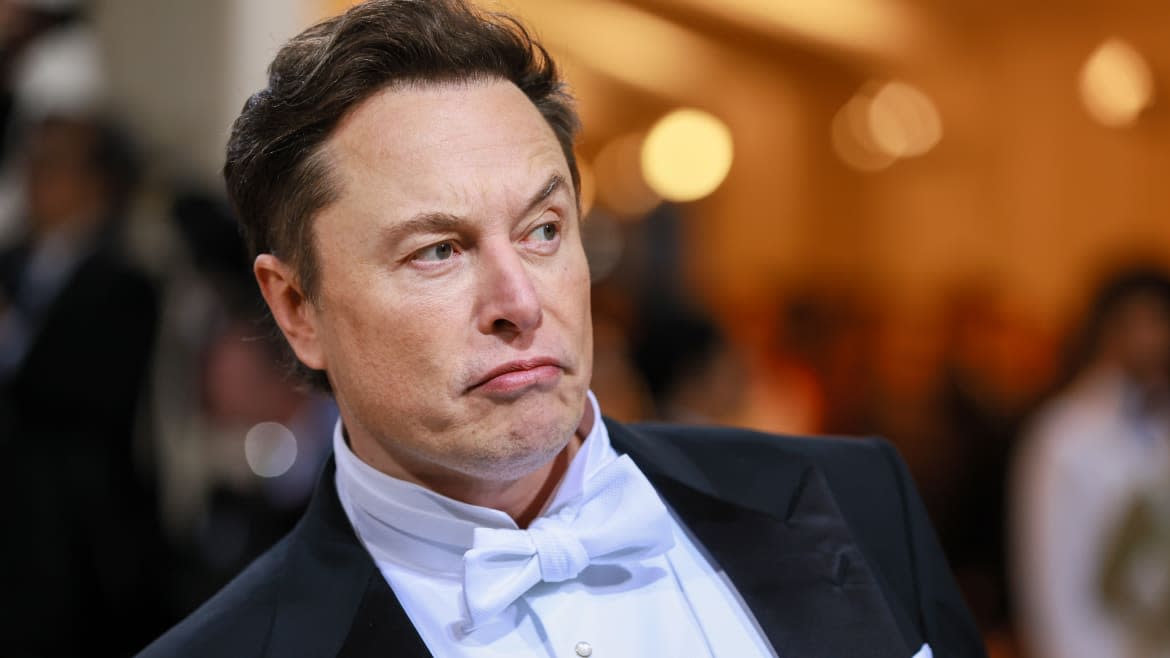Twitter Sues Elon Musk, Betting a Court Will Make Him Pay

- Oops!Something went wrong.Please try again later.
Twitter is refusing to back down to Elon Musk, the mercurial entrepreneur who is personally worth more than eight times the value of the company.
On Tuesday, the social media platform filed suit against Musk and corporate entities affiliated with him in the Delaware Court of Chancery for breaching his binding commitment to buy the business for $44 billion.
“Musk refuses to honor his obligations to Twitter and its stockholders because the deal he signed no longer serves his personal interests,” the company wrote in the filing. It has asked the court to force Musk to close the deal.
The Tesla mogul, for his part, penned a characteristically trollish tweet in apparent response. “Oh the irony lol,” he wrote after news of the filing was first broken by The New York Times.
Mike Isaac, a Times reporter, also shared an internal email from Twitter’s general counsel telling employees that it would seek an expedited trial in September.
Musk declared last week that he would walk away from the acquisition, claiming that Twitter had failed to substantiate its estimates about the volume of spam and fake accounts on its platform. Experts have expressed skepticism about whether a court will accept that argument as sufficient for reneging on the deal.
In its filing, attorneys for Twitter hammered Musk’s cold feet as a “model of hypocrisy,” noting that one of the main reasons he initially expressed interest in buying the company was to combat the spam issue. “But when the market declined,” the company argued, “Musk shifted his narrative, suddenly demanding ‘verification’ that spam was not a serious problem on Twitter’s platform.”
The origin of Musk’s Twitter feud traces to January, when he quietly began amassing the company’s stock. According to Tuesday’s lawsuit, by March 14 he had “secretly accumulated a substantial position — about 5% of the company’s outstanding shares.”
SEC regulations required Musk to disclose that position within 10 days, but it wasn’t until April that he revealed a more than 9 percent interest in the business. From there, chaos ensued.
Seeking to appease its well-financed provocateur, Twitter at first offered Musk a seat on its board, and he agreed. But the day he was expected to assume the role, he announced that he had changed his mind and would instead seek to buy the business outright.
Twitter didn’t take that reversal well. The company implemented a “poison pill”—a mechanism that makes it difficult for an individual shareholder to gain control of a company without its consent.
Eventually, however, Musk worked with Twitter’s leadership team and put forth a buyout offer priced at $54.20 per share, a figure that included the marijuana reference “420.” The company accepted.
Twitter’s lawsuit noted that the binding agreement did not include a provision for subsequent due diligence. It did include a provision that could allow Twitter to compel Musk to close the deal if he tried to back out without adequate cause.
Within weeks of the agreement, the tech markets started to tank, and Twitter’s stock fell in turn. (Shares are currently priced at about $34.50 apiece, more than a third below Musk’s agreed price.)
The billionaire then began signaling that he was having second thoughts about the acquisition. He publicly assailed Twitter’s spam problem and suggested—with scant evidence—that the company had wildly underestimated the number of fake accounts on its platform at 5 percent.
That complaint served as the basis of his decision to back out of the deal last week. But as lawyers on both sides blow off steam, the court will likely decide in the end whether Musk will have to pony up.
Get the Daily Beast's biggest scoops and scandals delivered right to your inbox. Sign up now.
Stay informed and gain unlimited access to the Daily Beast's unmatched reporting. Subscribe now.

